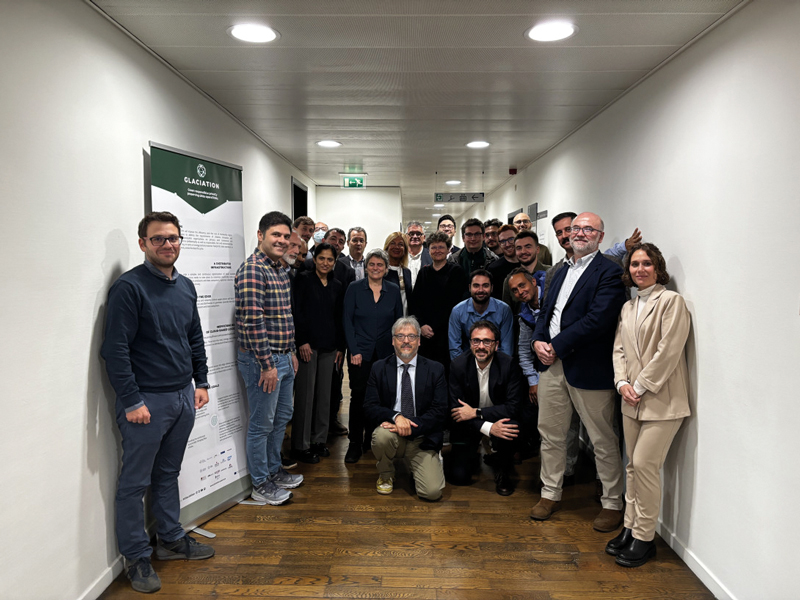by Peter Kunz (ERCIM)
With the GLACIATION project concluded in September 2025, the consortium presents a suite of validated tools and methods enabling energy-aware, privacy-preserving data operations in distributed infrastructures, demonstrated via four real-world pilots and publicly showcased at its Final Conference in Brussels.
The GLACIATION project (1 October 2022 – 30 September 2025) has reached its conclusion, having addressed a central challenge in modern computing: how to reconcile the needs of energy efficiency, privacy compliance, and performance in distributed ecosystems. As edge–cloud systems and AI workloads proliferate, energy consumption rises, while regulatory, ethical, and security expectations demand that data movement and computation be conducted with care. GLACIATION’s integrated approach has delivered a blueprint and working toolset to orchestrate data and compute flows adaptively, guided by energy metrics and privacy-aware decision logic.
From Concepts to Deployment: The Four Pilots
A key strength of GLACIATION is its grounding in real-world validation. The project deployed four pilots across distinctly different domains, each stressing different aspects of the methodology and infrastructure.
In the Edge-decentralized data management pilot, GLACIATION solutions were applied to a national public administration scenario focused on human resources management, aiming for resource efficiency while preserving high privacy standards. This setting tested the capacity to perform data operations across decentralized nodes without compromising confidentiality.
The Data-driven energy-efficient manufacturing pilot, led by Dell Technologies, targeted a highly digitalized manufacturing facility in Cork, Ireland. Here, robots (cobots and tugbots) produce a stream of operational data as well as diagnostic information. The pilot integrated this data flow into the GLACIATION platform to evaluate reductions in power consumption, improvements in predictive analytics, and better alignment of compute placement across edge, core, and cloud resources.
For Privacy-preserving cross-company analytics, GLACIATION teamed with SAP to tackle the challenge of collaborative data sharing across industrial boundaries. By employing privacy-enhancing techniques (such as secure computation and differential privacy), this pilot enables insights from multiple participating organizations without exposing sensitive data. The aim is to support joint analytics in sectors like automotive supply chains or production networks, overcoming siloed datasets under stringent regulation.
Finally, the Smart IoT for Enhanced Grid Efficiency and Resilience pilot, led by IPTO (Greece’s Independent Power Transmission Operator), bridges information technology and operational systems. It integrates smart IoT devices and new data centres in regions such as Attica, Crete, and the Cyclades, distributing load and data flows in harmony with green energy availability. The pilot assesses how GLACIATION can optimize energy use in power-grid–related infrastructures while ensuring data privacy and resilience.
Across these pilots, GLACIATION evaluated key metrics such as energy savings, latency trade-offs, privacy guarantees, and system robustness under variable loads. The diversity of settings highlights how the same core framework adapts to administration, manufacturing, enterprise analytics, and critical infrastructure.
Final Conference in Brussels: Dissemination and Closure
The GLACIATION consortium convened its Final Conference in Brussels on 16 September 2025, followed by the 6th and last General Assembly on 17 September 2025. These events marked the formal culmination of the project, bringing together consortium partners, external stakeholders, researchers, and industry representatives to present outcomes, reflect on lessons learned, and explore future directions.
During the conference, participants heard institutional perspectives on Europe’s vision for sustainable and secure data infrastructures, learned about the project’s major technical advances, and saw firsthand use-case demonstrations from the four pilots. Of particular interest were the trade-offs crafted between energy optimization and privacy protection, and the modular architecture that allows adaptation across domain boundaries. The consortium also discussed synergies with related Horizon Europe initiatives, aiming at future uptake and scaling of the GLACIATION approach.
The closing General Assembly afforded the team an opportunity to review the project’s final results, to assess performance against goals, and to set the stage for exploitation and follow-on collaboration.

Participants at GLACIATION’s Final Conference and Closing General Assembly.
Outlook
With its successful conclusion, GLACIATION leaves a set of methods, software components, evaluation results, and ethical guidelines. The project has shown that adaptive orchestration, informed by energy metrics and privacy constraints, is not only theoretically sound, but practically feasible across diverse domains.
The pilots provide evidence that energy savings and privacy guarantees need not be mutually exclusive, even in demanding industrial or infrastructure settings. As European and global digital landscapes evolve, the GLACIATION outcomes are well positioned to inform future green, trustworthy, and resilient infrastructures.
The project’s artifacts, tools, and assessments remain publicly accessible, and the consortium is open to engaging with research and industry actors interested in taking these results forward. The closing conference in Brussels underscored that while the project’s formal phase is over, its influence and potential impact are just beginning.
ERCIM was leading the technical development of the metadata model for data-centric architectures as well as the standardisation activities. It contributed to the design of the architectural blueprint of the GLACIATION platform and was involved in defining the system components, developing the kernel, and establishing a secure data management framework tailored for AI. Furthermore, ERCIM supported the creation of a policy model and language to ensure compliance and interoperability, and contributed to the development of an intuitive UIX for the Distributed Knowledge Graph (DKG).
Link:
https://glaciation-project.eu/
Please contact:
GLACIATION project










